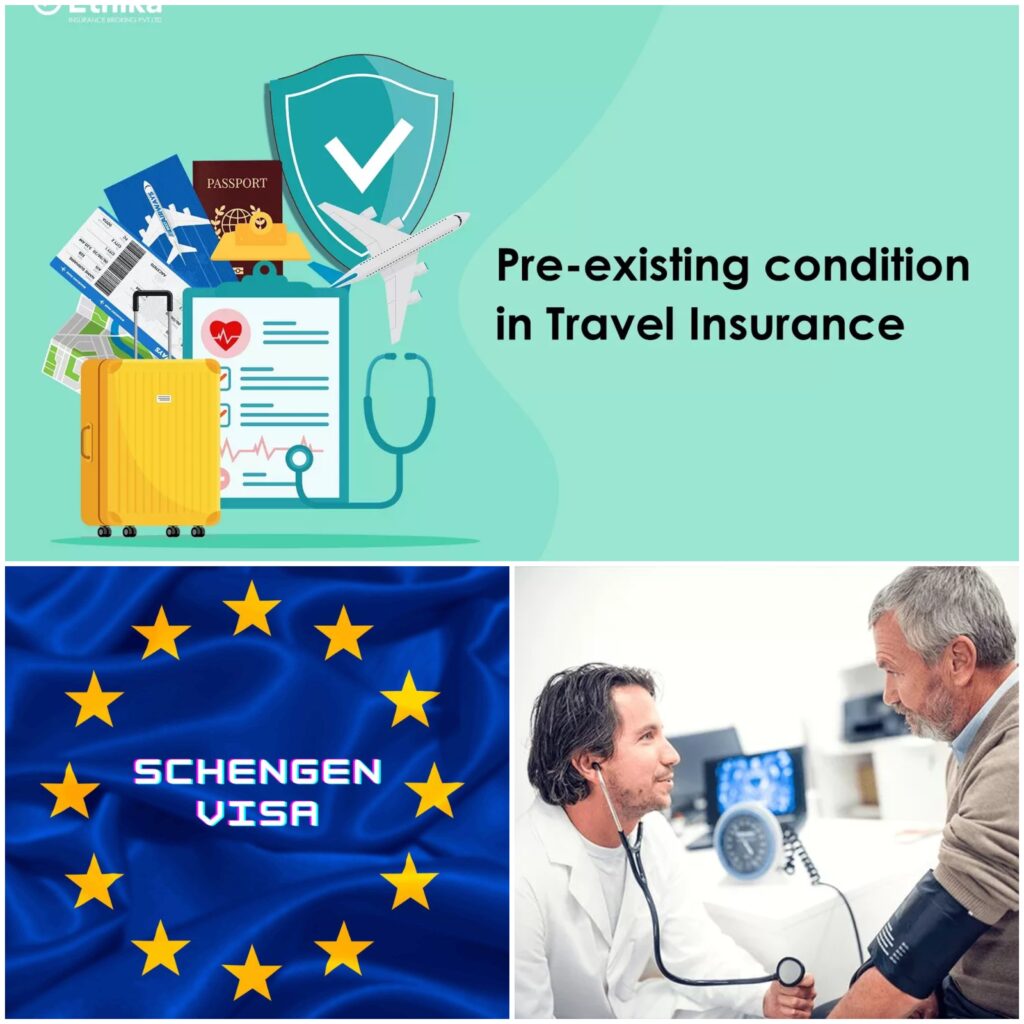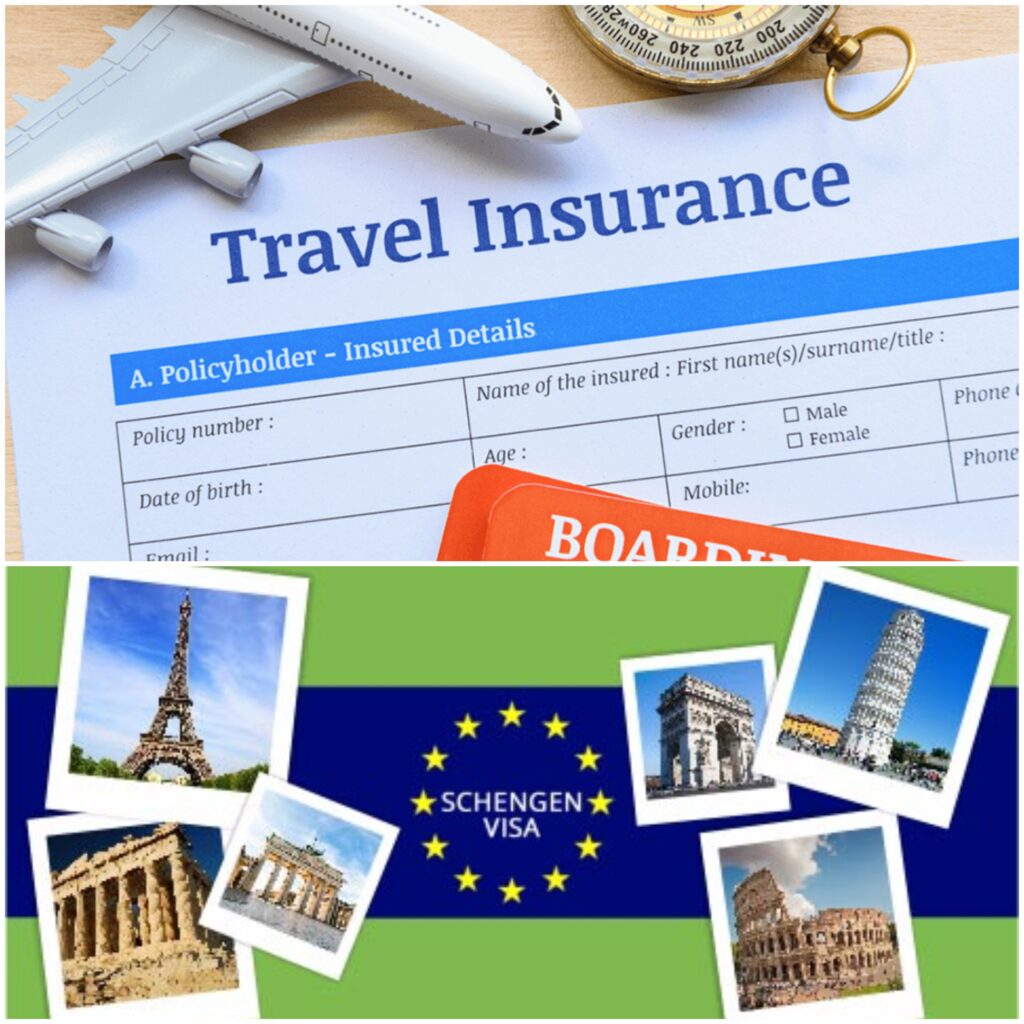Are you considering a trip to Europe and would like to know what is needed for getting a Schengen visa? Schengen visa insurance is an important factor to take into consideration.
Let’s explore the key details you should be aware of regarding Schengen visa insurance, including what it is, why it is required, and how to get it.

What is Schengen Visa Insurance?
You can enter any of the 29 European countries that make up the Schengen Area with a Schengen Visa.
Having current travel insurance that will cover you while you are there is one of the requirements needed to obtain this visa.
Best Schengen Travel Insurance – CLICK HERE
Schengen Visa Insurance Requirements
- Medical Expenses
Medical costs must be covered by your insurance policy up to a minimum of €30,000.
This guarantees that, should you become ill or get hurt while traveling, your finances will be covered.
- Repatriation
In a serious medical emergency, the insurance should also cover repatriation costs, which involve arranging arrangements for your return to your home country.
- Duration
Your entire stay in the Schengen area travel insurance must be covered by the insurance.
Schengen Visa Application Form – CLICK HERE
Why Do You Need Schengen Visa Insurance?
1. Mandatory Requirement
- Your application for a Schengen visa will be automatically denied by the embassy if you do not have valid insurance.
2. Peace of Mind
- Knowing that you are covered in the case of an unexpected medical emergency provides you peace of mind.
3. Legal Compliance
- Insurance certificates from recognized providers are accepted by consulates and embassies representing Schengen countries; this is a legal requirement.
What Does A Schengen Visa Cover?
Think about the following options when selecting insurance for a Schengen visa,
1. Basic Coverage
- Find out health insurance that pays up to €30,000 toward medical costs. Travelers on a tight budget should do this.
2. Extended Coverage
- Choose insurance that pays for medical costs up to €100,000 in Great Britain, Ireland, and Schengen countries if you want more complete protection.
3. Annual Multi-Trip Plan
- An annual plan offers coverage all year round for frequent travelers.

Best Schengen Visa Insurance Cover Countries for Europe
The following European countries are covered by Schengen Visa insurance for medical costs,
Austria, Belgium, Croatia, Czech Republic, Denmark, Estonia, Finland, France, Germany, Greece, Hungary, Iceland, Italy, Latvia, Liechtenstein, Lithuania, Luxembourg, Malta, Netherlands, Norway, Poland, Portugal, Slovakia, Slovenia, Spain, Sweden, Switzerland, United Kingdom, Bulgaria, Cyprus, and Romania.
Applying for a Schengen visa – CLICK HERE
What Are the Common Exclusions in Schengen Visa Insurance?
Before you book your trip, make sure you are aware of any exclusion that is usually included in insurance policies for Schengen visas.
Insurers are better able to control their exposure to future claims because of these exclusions.
The following are a few typical exclusions from Schengen Visa insurance,
1. Pre-existing Medical Conditions
Pre-existing medical conditions are typically not covered by Schengen insurance policies. You had these medical issues before your trip.
Before you travel, insurers expect you to manage any pre-existing conditions through other methods (like regular health insurance), as they view them as a key component of your regular medical care.
2. Normal Pregnancy
Normal prenatal visits, childbirth, and related costs are not regarded as unexpected situations that are covered by travel insurance.
Yet, complications related to pregnancy that may arise while traveling are covered by the insurance for Schengen visas.
You may be able to cancel your trip for pregnancy-related reasons if you get pregnant after buying a Schengen travel insurance policy, but you will probably need to present medical documentation proving that the pregnancy happened after the policy’s purchase date.
Read: Which Countries will join Schengen in 2024?
3. High-Risk Activities
Typically, exclusion applies to claims resulting from engaging in risky sports or activities.
These exclude medical conditions, disease, equipment loss or damage, and direct personal financial losses resulting from such activities.
4. Illegal Activities
Things connected to criminal activity are not covered by Schengen Visa insurance.
Your insurance will not cover you if you take part in any illegal activity.
5. Mental Health and Psychological Conditions
Usually excluded is treatment for nervous system disorders or mental health issues.
Routine or continuing treatments are not covered, but emergency medical situations relating to mental health may still be.
It is important to pay close attention to the terms and conditions of your insurance policy related to your Schengen Visa to fully understand the exact limitations and exclusions.
If you are unsure, think about getting more insurance or speaking with your insurer.

What Should Travelers Do If They Have Pre-Existing Conditions?
To guarantee an easy and secure journey, travelers with pre-existing medical conditions should take the following actions.
1. Declare Your Condition
- Honesty is necessary
Please be honest when declaring any pre-existing conditions when applying for insurance for a Schengen Visa. Later claim denials could result from not disclosing them.
- Insurance providers need to know
Tell your insurance provider about all of your unique medical conditions so they can evaluate the risk and offer the right kind of coverage.
2. Check Coverage
- Review your policy
Recognize what pre-existing conditions are covered by the insurance on your Schengen Visa.
- Exclusions
Pre-existing condition coverage may be completely excluded from some policies, restricted in others, or subject to higher premiums.
3. Seek Specialized Coverage
- Specialized policies
If you have a pre-existing condition, think about getting the best travel insurance for Schengen Visa.
- Higher premiums
Even though these policies have higher premiums, the coverage they offer is customized to meet your specific health needs.
4. Medical Records and Documentation
- Carry relevant documents
Bring copies of your prescriptions, doctor’s notes, and medical records with you.
- Translations
Have your documents translated if they are not in English or the official language of the Schengen country you are visiting.
5. Emergency Plan
- Know local emergency numbers
Know who to call in case of emergency in the Schengen country you are visiting.
- Medical facilities
In case you require medical attention, look up surrounding clinics and hospitals.
6. Medication and Supplies
- Carry enough medication
Make sure you have enough of the prescribed medicines with you for the duration of the trip.
- Prescription details
Because brand names might differ in other countries, make a note of the generic names for the medicines you take.
7. Travel Companions
- Inform your travel companions
Make sure anyone you are traveling with is aware of your condition and how to help you in an emergency.
8. Travel with a Companion
- Consider traveling with someone
Having a travel companion can be beneficial, particularly if you meet health problems while away.
Keep in mind that every traveler’s circumstances are different, so it is critical to speak with your insurance company and your doctor to make decisions that are customized to your particular requirements.
Read: Which European country gives work visa easily?

What is the Process for Submitting Proof of Schengen Visa Insurance?
To prove you have Schengen visa insurance, you must get an official document or certificate from your insurance provider that satisfies certain requirements.
- Full Policy Information
It should be made very clear on the certificate that this is an insurance policy intended to be used with a Schengen visa.
- Insurance Company Details
Provide the insurance company’s complete name, address, and phone number.
- Policyholder Information
The certificate must include your entire name as the policyholder.
- Policy Number
You should include the unique identification number that has been assigned to your policy.
- Effective Dates
To make sure that the coverage is valid for the whole time of your supposed stay in the Schengen Area, the certificate should specify the start and end dates of the coverage.
- Coverage Amount
In addition to confirm that the coverage meets the minimum requirement of €30,000 or more. The certificate should specify the coverage amount in euros (€).
- Coverage Details
Particular coverage, like medical costs, emergency hospitalization, return of remains, and emergency medical evacuation, should be specified in the certificate. It should also include coverage in each country that is part of the Schengen Area.
- Signature and Stamp
To verify the validity of the certificate, an authorized representative of the insurance company must sign and stamp it.
It is also necessary to make sure the certificate is issued in the necessary language, or if necessary, have a certified translator translate it.
This certificate, which attests to the validity of the insurance required for travel within the Schengen Area, is a necessary part of your Schengen visa application.

What Should I Do If I Lost My Proof of Schengen Visa Insurance?
You must act quickly to resolve this issue if you have lost your documentation for Schengen visa insurance coverage.
What you should do is as follows,
1. Contact Your Insurance Provider
- Inform your insurance provider of the lost proof of Schengen tourist insurance by getting in touch with them as soon as you can.
- They can give you a duplicate copy or advise you on how to go about getting a new document.
2. Request a Duplicate Certificate
- For your Schengen visa application, ask your insurance company to provide a duplicate certificate or official document attesting to your insurance coverage.
- Make sure that this copy has all the necessary details, including the policy text, coverage amount, effective dates, and the insurance company representative’s signature and stamp.
3. Keep Records
- Keep a record of all correspondence with your insurance company about the misplaced insurance documentation.
- Note the time and date of your contact, the representative’s name, and any instructions you were given.
4. Inform the Embassy or Consulate
- Inform the Embassy or Consulate of your situation if you have already applied for a Schengen visa without providing proof of insurance.
- They might offer advice on what to do next and whether you can submit a replacement document.
5. Follow Embassy Guidelines
- When submitting a replacement proof of insurance, stick by any special guidelines that the Embassy or Consulate may provide.
- They might ask for more paperwork from you or demand that you take specific actions to make things right.
6. Be Proactive
- To prevent any delays or issues with your travel insurance for Schengen visa application process, take immediate action to address the lost proof of insurance.
- The key to effectively resolving this issue is prompt communication with the appropriate authorities and your insurance provider.

Frequently Asked Questions
1. Which insurance is needed for a Schengen visa?
Ans: You must have travel insurance with at least €30,000 coverage to obtain a Schengen visa. It needs to cover repatriation, medical emergencies, and the whole Schengen area for the duration of your trip.
2. Is health insurance compulsory for Schengen visa?
Ans: Yes, to visa for the Schengen area, one must have travel insurance that covers medical expenses.
3. How many days of insurance is required for a Schengen visa?
Ans: If your trip lasts 5 days, your insurance must cover those 5 days; if it lasts 3 weeks, your insurance must cover the full 3 weeks.
4. Can I get travel insurance if I have already departed?
Ans: Yes, “already departed” or “last-minute” travel insurance is provided by certain insurers. Yet, there may be a waiting period before coverage begins, and coverage will not include any incidents that occurred before the purchase.
5. How much is the travel insurance for Schengen Visa?
Ans: The cost of travel insurance for a Schengen visa varies depending on the length of the trip and the type of coverage chosen, but it normally starts at €22 (US$23) for a week-long trip.
Bottom Line
Not only is Schengen Visa insurance a requirement for compliance and safety, but it is also a formality.
Select an honest insurance provider to make sure a worry-free travel experience whether you are planning a quick getaway or frequent visits.
Keep in mind that an intelligent traveler is ready for anything.
Read: Schengen Visa Requirements – Should Know Before You Go
3 thoughts on “Schengen Visa Insurance: A Comprehensive Guide for Travelers”